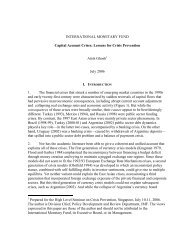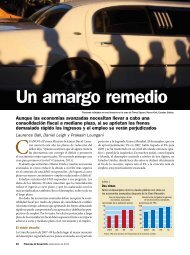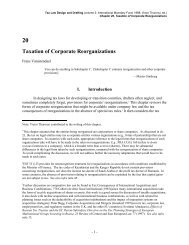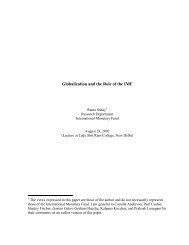Insolvency â why a special regime for banks? by Eva Hupkes ... - IMF
Insolvency â why a special regime for banks? by Eva Hupkes ... - IMF
Insolvency â why a special regime for banks? by Eva Hupkes ... - IMF
Create successful ePaper yourself
Turn your PDF publications into a flip-book with our unique Google optimized e-Paper software.
substantial involvement of the courts in the bank insolvency procedure, such as France,<br />
Luxembourg, Spain, the United Kingdom and Switzerland (under current law), the bank<br />
supervisor must apply to the courts <strong>for</strong> protection against creditor action. In other<br />
jurisdictions, such as Germany, Italy, and Switzerland (under the proposed amendment to the<br />
Swiss Banking Act), the bank supervisory authority itself has the power to impose a<br />
moratorium against creditor action. 81 Which solution is preferable? The first option has the<br />
potential <strong>for</strong> causing delays if the application to the court is anything more than a <strong>for</strong>mality,<br />
granted in all cases without deliberation. The bank supervisor is generally better placed than<br />
the courts to decide what action needs to be taken (e.g., whether an immediate suspension of<br />
payments and stay on en<strong>for</strong>cement is necessary). Also, court action is inevitably associated<br />
with a bankruptcy procedure and may frustrate any reorganization attempts, short of<br />
bankruptcy.<br />
The moratorium has far reaching affects on creditors in that they cannot en<strong>for</strong>ce their claims<br />
<strong>for</strong> its duration. A general moratorium that blocks all payment streams will be inappropriate in<br />
most cases given the needs of bank customers and households. Even in a situation of severe<br />
financial difficulty it is not possible to halt all bank activities. The bank must continue to<br />
operate, even as it scales down the size of its books to reduce the potential <strong>for</strong> systemic risk.<br />
A moratorium is there<strong>for</strong>e generally combined with some <strong>for</strong>m of controlled management or<br />
provisional administration, where<strong>by</strong> the bank supervisor directly or indirectly takes control of<br />
the management of the bank and has the power to authorize exemptions from a suspension of<br />
payments. 82<br />
There are different <strong>for</strong>ms of provisional administration. For example, in France, the Banking<br />
Commission can appoint a provisional administrator with all the powers <strong>for</strong> administering,<br />
managing and representing the bank, including the power to petition <strong>for</strong> bankruptcy<br />
proceedings. 83 The Bank of Spain likewise has the capacity to replace the management of a<br />
distressed bank and to appoint provisional administrators (administradores provisionales). 84<br />
Under Portuguese banking law, the Bank of Portugal can appoint one or more provisional<br />
administrators to a bank with serious financial difficulties 85 and confer to them all powers and<br />
duties of the board of directors and managers. 86 Whereas in France and Spain such power is<br />
reserved to judicial authorities, the Portuguese supervisor has the power, concurrent with the<br />
81 See Hüpkes, supra note 36, at 52.<br />
82 “Provisional administration” refers to the appointment of administrators <strong>by</strong> the bank<br />
supervisor <strong>for</strong> the purpose of managing a bank in the short term. The existing management<br />
will be dismissed or have its powers suspended during the period in which the provisional<br />
administrator is in control.<br />
83 France: Art. 44 of the Banking Act.<br />
84 Spain: Article 31 of the Law 26/1988 on the Regulation and Supervision of Credit<br />
Institutions.<br />
85 Portugal: Art. 143 (1) Decree-law 298/92 on the Legal Regime <strong>for</strong> Credit Institutions and<br />
Financial Companies.<br />
86 Id., Art. 143 (2). The administrators also have the power to veto decisions of the<br />
shareholders.<br />
18

















